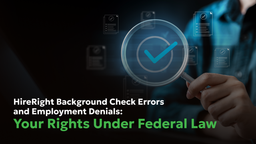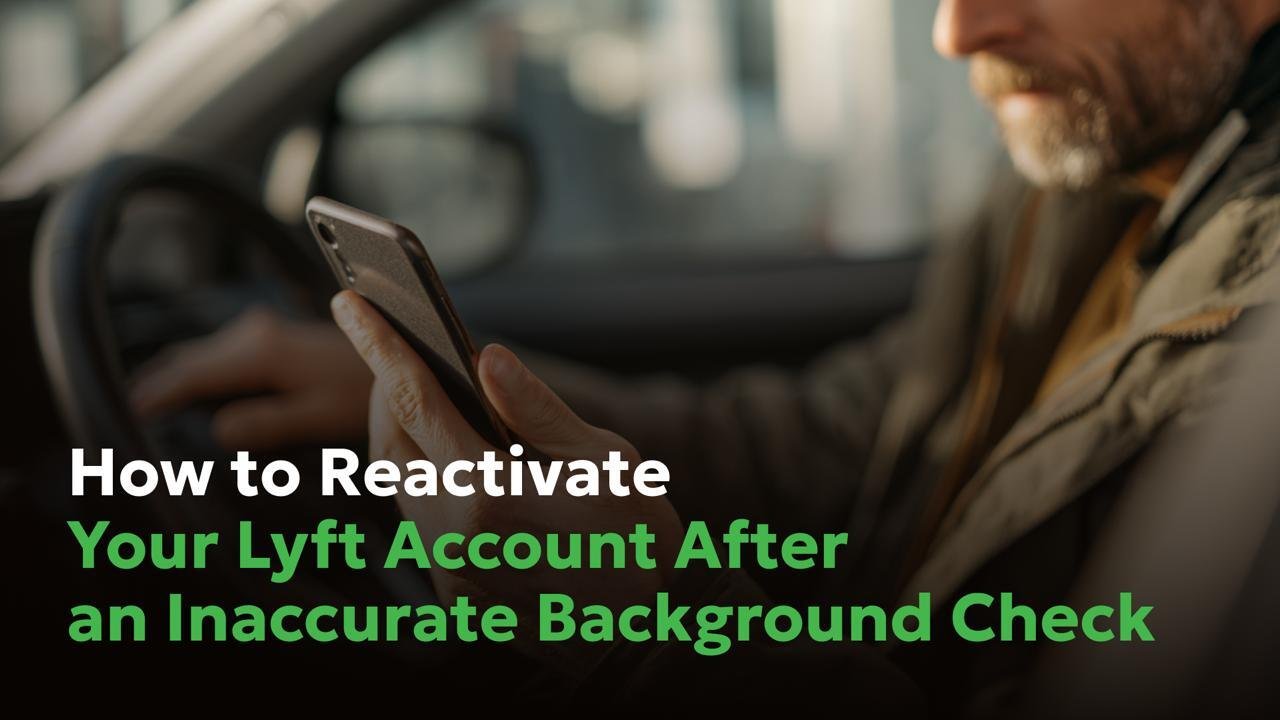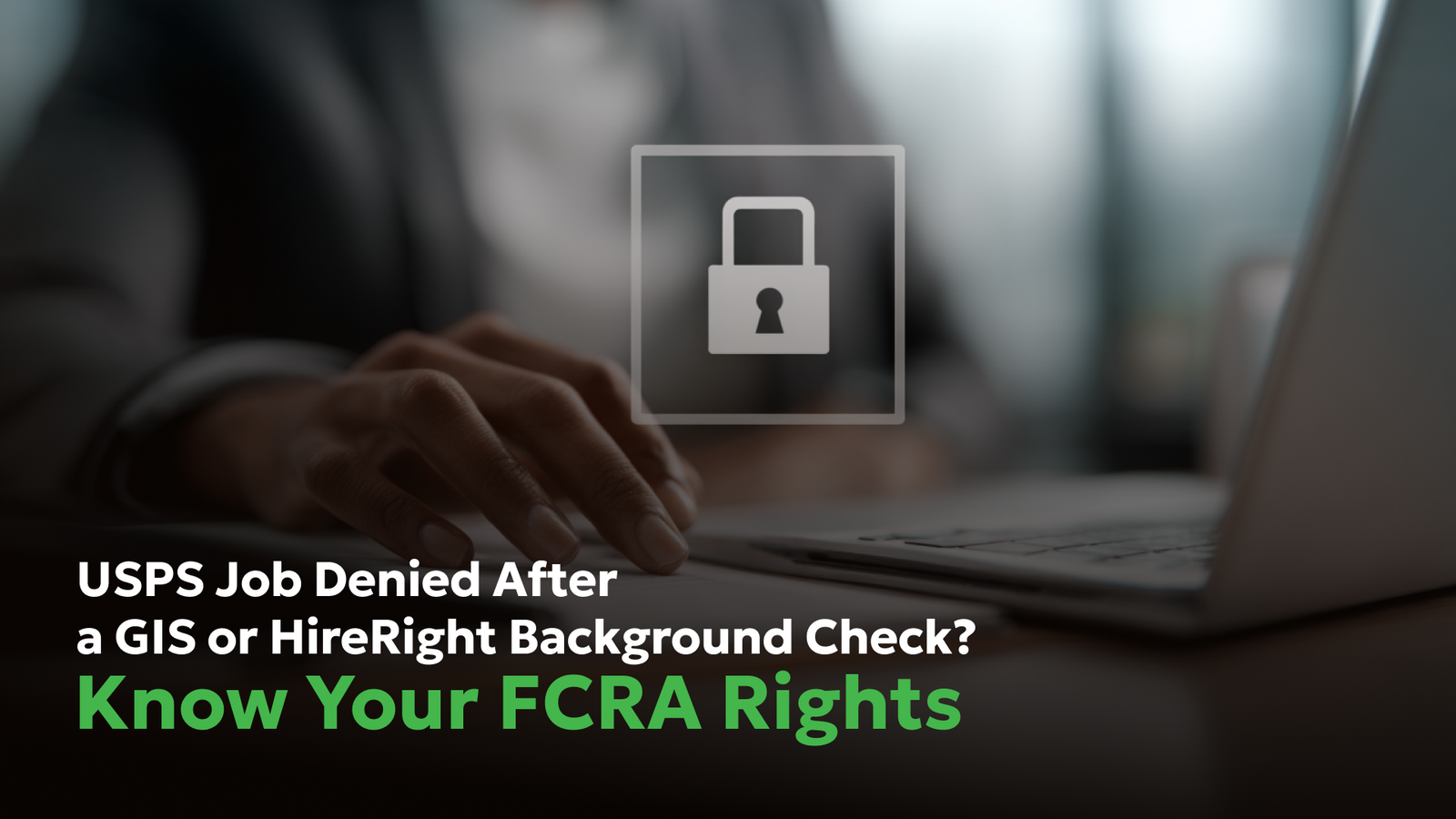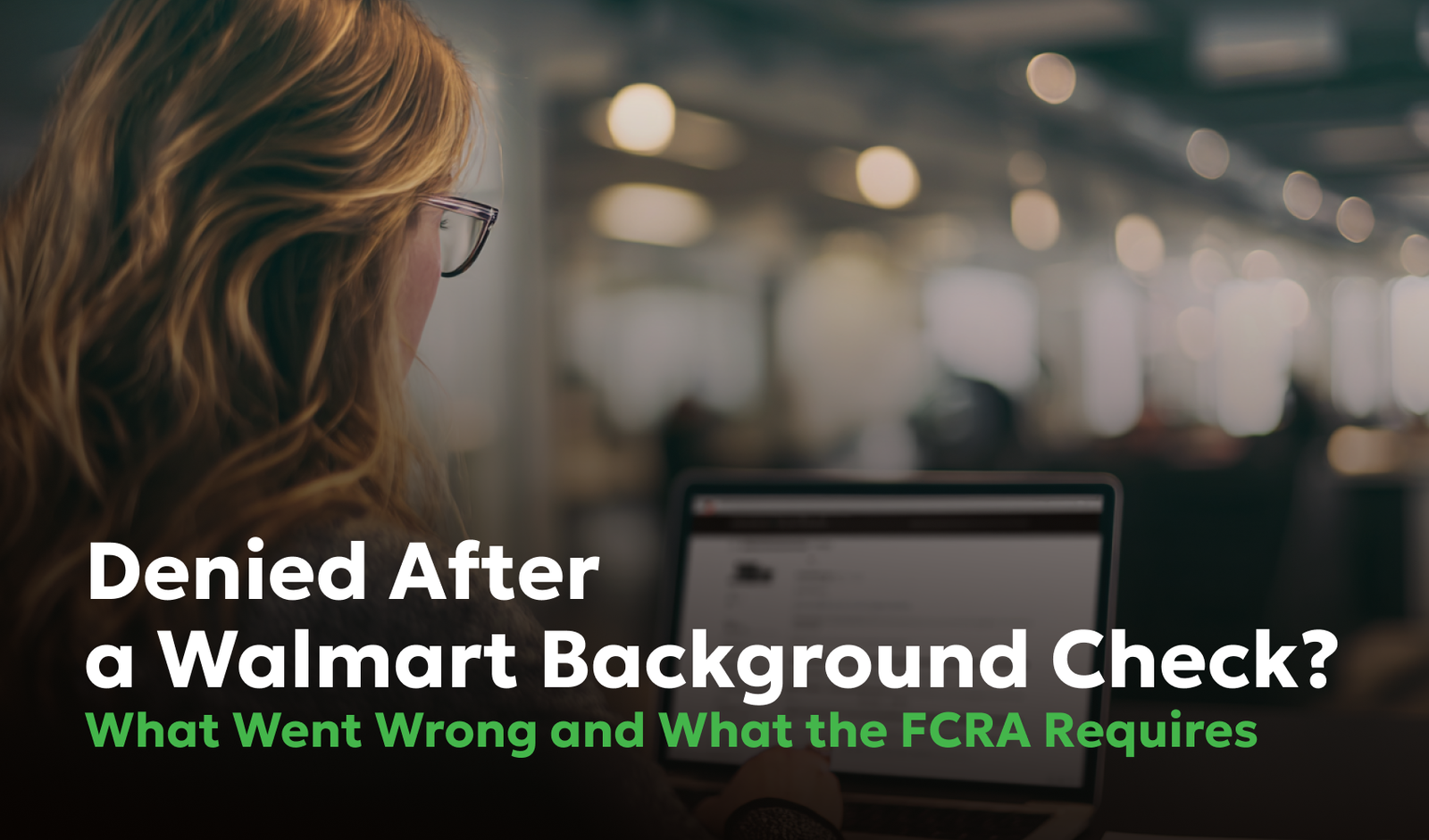Time to Shield Yourself: What You Need to Know About Shield Screening Errors
- Blog
- Employment Background Check Errors
Time to Shield Yourself: What You Need to Know About Shield Screening Errors

Struggling with a failed Shield Screening background check? Learn how to fight back and protect your future!
Failed your Shield Screening background check? Don’t panic. Learn how to fix errors, protect your rights, and take legal action. Discover how working with a background check attorney really matters.
If you’ve just discovered that you failed a background check, you’re probably feeling a mix of confusion, anger, stress, disappointment, and frustration. And honestly, who wouldn’t? It can feel incredibly unfair, especially when that background check is what’s standing between you and a job or a place to live, and especially when the background check is from a faceless company like Shield Screening which doesn’t know you, your circumstances, or why you need this job. It might seem like the whole process is out of your hands, but here’s the good news: you have rights. You don’t have to just accept the results. You can take steps to protect yourself and correct any mistakes or inaccuracies in your report.
Whether you're facing issues with an employment background check, a rental screening, or a criminal background report, understanding how Shield Screening works and what to do if there’s a problem with your report is critical. The background check lawyers at Consumer Attorneys share what we’ve learned about Shield Screening.
About Shield Screening
Shield Screening is a company that provides background screening services to employers, landlords, and other entities that need to vet individuals for various reasons. This can range from conducting criminal background checks to verifying past employment and even drug testing. While these checks are meant to help organizations make informed decisions, the process can sometimes go wrong, leading to inaccurate or unfair reports that may affect your ability to secure a job or housing.
Shield Screening claims to prioritize accuracy and compliance with federal laws, such as the Fair Credit Reporting Act (FCRA). The FCRA contains a provision that requires companies like Shield Screening to use reasonable care to ensure the accuracy of its reports.
However, errors still happen; when they do, they can have serious consequences for consumers like you. That's why it's crucial to know your rights and understand what you can do to protect yourself.
How Does Shield Screening Conduct Background Checks?
Shield Screening pulls together various pieces of information from public records, databases, and other sources to compile a report. These reports often include criminal history, employment verification, education verification, and sometimes even drug testing results. But as comprehensive as these reports may seem, they’re not immune to errors.
How Long Does a Background Check from Shield Screening Take?
The timeline for a background check through Shield Screening can vary depending on the complexity of the report. A basic check might take only a few days, while more detailed reports, such as those that require verification of employment or education or criminal records from multiple states, could take a week or more. If you find yourself waiting for a response, it’s a good idea to regularly check the status of your report. Employers or landlords might pressure you to act quickly, but Shield Screening background check status updates should be available if delays arise.
What Information Does Shield Screening Provide in Their Background Checks?
A Shield Screening background check will likely include several types of information:
Shield Screening Criminal Background Check
A criminal background check is a common part of many background checks, especially for employment or housing. It examines past convictions, arrests, or other criminal records. Shield Screening gathers this information from various public databases, but mistakes in reporting, such as outdated or incorrect records, can occur. Additionally, in most states, background checks should not contain criminal convictions older than seven years. There are exceptions to this. If you failed a Shield Screening background check because you had an old criminal conviction show up, let us know.
Shield Screening Background Check for Rental Property
Landlords may use Shield Screening to examine your rental history, criminal background, and credit reports before deciding whether to approve your rental application. These reports may flag prior evictions or criminal history, but they can also contain inaccuracies, like reporting an old eviction as recent or flagging the wrong person.
Shield Screening Background Check for Employment
Employment background checks from Shield Screening typically verify past employment, check for criminal history, and sometimes include drug testing results. Errors can happen here too, such as incorrect employment dates or mixing up your information with someone else’s. If you’ve had issues with a Shield Screening employment screening, you're not alone.
What Are Consumers’ Rights When Verifying Their Background Check?
As a consumer, you have the right to know what is being reported about you and the opportunity to correct any errors. Under the FCRA, companies like Shield Screening must provide you with a copy of your background check if requested. The company or landlord requesting he background check must also have a valid reason to do so and must get your written permission to do so. If the report contains errors, you can dispute the findings, and Shield Screening is legally required to investigate the dispute and make corrections if necessary. The consumer protection attorneys at Consumer Attorneys can help you navigate this process and ensure your rights are upheld.
Which Companies Use Shield Screening for Background Checks?
Shield Screening provides background check services for a wide range of industries. Employers, landlords, and even volunteer organizations might use their services to verify an applicant's history. Shield Screening’s clients span multiple sectors, including healthcare, education, retail, and property management.
What Do Companies Use Shield Screening Background Checks For?
Companies use Shield Screening background checks for different reasons. Employers rely on these checks to ensure potential hires are trustworthy and qualified. Landlords use them to vet tenants and minimize risks of non-payment. Organizations sometimes use Shield Screening to conduct drug tests as part of their decision-making process. Knowing what Shield Screening looks for can help you understand how any company or landlord uses the background check report.
Can Errors Occur in Background Checks from Shield Screening?
Unfortunately, errors can and do happen in background checks from Shield Screening. These errors can devastate your life - preventing you from landing a job or securing a place to live.
What Causes Errors in Background Checks?
Background check errors typically stem from misreported or outdated information. Shield Screening sometimes pulls information from old databases or mixes up your details with someone else’s. Human error is also a factor when the data is collected, processed, or reported.
Main Types of Errors
The most common types of errors in background checks include:
- Misidentification. Your name or information gets confused with someone else’s.
- Outdated information. A criminal conviction or eviction that should no longer appear on your report still does.
- Incorrect employment or education details. Wrong dates or missing entries in employment verification.
- Misreported criminal records. Past arrests or convictions that don’t belong to you but appear on your record.
How Often Do Errors Occur in Background Checks from Shield Screening?
While Shield Screening strives for accuracy, errors in background checks are more common than you might think. According to a 2021 report by the National Consumer Law Center, up to 94% of employers and landlords rely on background check companies, and as many as 1 in 5 background checks contain inaccuracies. These errors can range from outdated criminal records to incorrect personal information.
Given that Shield Screening, like many companies, depends on massive databases and public records, mistakes can and do happen. The key is acting quickly if an error impacts your background check. Under the FCRA, you have the right to dispute any inaccuracies, and Shield Screening must investigate and correct the report if errors are found. By staying proactive, you can reduce the chances of losing a job or housing opportunity due to a mistake in your background check.
What Are the Consequences of Having Errors in Your Background Check Report?
The short answer to this question is: it depends. This chart should help:
| Type of Error | Potential Consequences | Why It’s Important to Fix | What You Can Do |
|---|---|---|---|
| Criminal History Errors | - Job rejection - Loss of job offer - Damage to reputation | Employers often disqualify candidates with a criminal record, even if it’s inaccurate. | Dispute the error with Shield Screening under the Fair Credit Reporting Act (FCRA). |
| Employment History Errors | - Denied job due to incorrect work history - Missed promotion | Incorrect employment dates or job titles can raise red flags for employers. | Gather documentation and submit a dispute to correct the misinformation. |
| Rental Screening Errors | - Denial of rental application - Loss of housing opportunity | Landlords may refuse to rent to you based on erroneous past evictions or payment issues. | Review your rental history and dispute any inaccuracies immediately. |
| Credit Report Errors | - Higher interest rates - Loan or credit denial | Inaccurate credit information can impact your financial standing. | Request your credit report and fix any errors affecting your background check. |
| Identity Confusion Errors | - Being mistaken for someone else - Unwarranted criminal records | A mistaken identity can lead to you being blamed for someone else's actions. | Contact Shield Screening and provide proof of identity to resolve the confusion. |
*You can also contact the background check lawyers at Consumer Attorneys at any time. Tell us your story. We can assess your situation and guide you through the best next steps.
You Can Contact Shield Screening if You Need to Correct an Error in the Background Report
If you spot an error in your Shield Screening background check, you have the right to dispute it. Contact Shield Screening directly to report the mistake. They must investigate and, if necessary, correct the information in your report. Be sure to gather any supporting documentation that proves the error and submit it promptly.
Contact Consumer Attorneys as soon as you get news of a failed background check. We will guide you on the best next steps to take. Too often, doing things via a company’s website means you waive your rights to sue them later. In other words, companies like Shield Screening are very good at shielding themselves from liability.
What to Do if You Do Not Receive Answers to Your Questions on the Background Report
If Shield Screening is unresponsive or unwilling to correct the error, you don’t have to handle it alone. Contact a background check lawyer or consumer protection attorney who can help you fight back. There are strict timelines that Shield Screening must follow, and if they fail to respond or correct an issue, you may have legal grounds to take further action.
You Can Sue Shield Screening if Your Report Contains Errors
In cases where Shield Screening refuses to correct an error or if the error causes significant harm—such as losing out on a job or being denied housing—you may be able to sue the company for damages.
Who Can You Contact to Solve the Problem With an Error in the Background Report from Shield Screening?
A consumer protection attorney is your best ally when it comes to dealing with errors in a background check. These lawyers understand the complexities of the FCRA and can help you hold Shield Screening accountable if they fail to fix the problem.
Assistance in Disputing Shield Screening Background Report
If you've already tried to dispute the report with Shield Screening and haven’t succeeded, it's time to seek legal help. A background check lawyer can assist you in disputing the report, ensuring your case gets the attention it deserves.
You Deserve Someone to Shield You, Too!
While Shield Screening markets itself as a reliable background check provider, it works for companies that pay them. There are too many cases of consumers being wronged by errors. Let us be the ones to take legal action for someone else’s failure to comply with the law.
If a Shield Screening report error has harmed you, you can feel angry, stressed, disappointed, and confused. But don’t feel powerless. You have the right to accurate background checks, and when Shield Screening doesn’t deliver, legal options are available. With the help of a consumer protection attorney, you can challenge an incorrect report, protect your reputation, and hold companies accountable for the harm they cause. Contact Consumer Attorneys today to ensure your rights are protected, and you receive the fair treatment you deserve.
Frequently Asked Questions
Yes, Shield Screening is a legitimate company. It provides background screening services for employers, landlords, and other entities. Shield Screening operates under federal regulations, including the Fair Credit Reporting Act (FCRA), which requires them to provide accurate and up-to-date information when conducting background checks. However, like any background check company, errors can occur, and reports may sometimes contain inaccurate information. If you encounter any mistakes in your Shield Screening background report, you must dispute them and ensure they are corrected. Even though Shield Screening is a reputable company, exercising your rights under consumer protection laws is key to protecting yourself from potential harm caused by incorrect or misleading background check information.
Most employers use a combination of criminal background checks, employment verification, education verification, and sometimes credit reports, depending on the industry and position. Common background check companies that employers turn to include Shield Screening, HireRight, Sterling, and Checkr, among others. Employers may also run drug tests and driving records if the job requires it. Criminal background checks are among the most common elements, reviewing national databases and public records to check for past convictions. While these checks can reveal helpful information for employers, it’s important for candidates to know their rights under the Fair Credit Reporting Act (FCRA) and dispute any inaccuracies.
No U.S. state completely prohibits background checks, but some states have laws that restrict the use of certain types of background information in employment decisions. For example, California, New York, Hawaii, and Massachusetts have “Ban the Box” laws that prevent employers from asking about criminal history on job applications and may limit how far back employers can look into criminal records. Additionally, some states restrict reporting certain offenses, such as non-convictions or crimes older than seven years. It’s important to know the laws in your state, as they can significantly impact what information shows up in a background check and how employers can use it.
The time frame that criminal background checks can cover depends on state laws and the type of check being performed. Under the Fair Credit Reporting Act (FCRA), non-conviction information (such as arrests without conviction) cannot be reported after seven years. However, actual convictions can typically be reported indefinitely unless restricted by state law. For example, in states like California, New York, and Texas, criminal background checks are generally limited to seven years for certain jobs. Some roles that involve high-level security clearance or regulated industries, such as healthcare or finance, may have more lenient restrictions, allowing for a deeper look into someone’s criminal history.


Daniel Cohen is the Founder of Consumer Attorneys. Daniel manages the firm’s branding, marketing, client intake and business development efforts. Since 2017, he is a member of the National Association of Consumer Advocates and the National Consumer Law Center. Mr. Cohen is a nationally-recognized practitioner of consumer protection law. He has a we... Read more





Related Articles




R
ONGS™You pay nothing. The law makes them pay.


